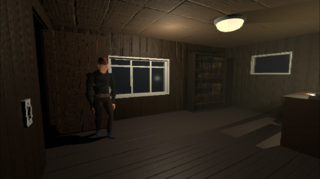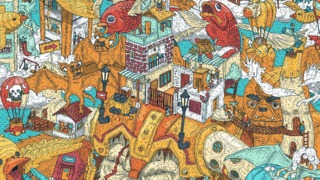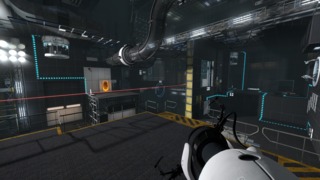
Lo-Fi Plays is aseriesinwhich I set out in search of games that are compact, developed on little to no budget, or that otherwise lurk in the shadows of obscurity. This is not a safari of the technologically extraordinary; I am combing for pet projects that do something innovative, charming, or otherwise noteworthy. Here's the crop of downloadables for March 9th. Everything on this list is free or "name your own price", so jump right in if you see a title that interests you.
Windowkill

Windowkill resides in the burgeoning genre of "ya gotta see this thing". Most of the time a game tells you to "think outside the box" that's a metaphor, but not when developer torcado has their way. Windowkill is a twin-stick shooter where you take on that most heroic of narrative archetypes: the circle, and the walls are always closing in. Both you and the enemies collide with the boundaries of the window you play in, and without resistance, that window shrinks. If you don't do something, you'll be crushed. It's your bullets that come to the rescue. They serve an elegant dual function, shattering enemies but also pushing back the edges of the screen.
If you want to stay alive, you need to divide your shots judiciously between the walls of the window and the malevolent shapes that beset you on all sides. It doesn't sound like you'd have to dedicate more than nominal brain power to that, but in practice, the play feels like spinning plates. The metamorphic frame mangles the traditional wisdom about where media stops and where the outside environment begins. Like most innovative art, Windowkill transforms something that you didn't consider could be transformed.
While a Robotron or a Geometry Wars leaves an open highway of reward before you, Windowkill has regular progression checkpoints. Those checkpoints come in the form of items you can buy once you have the coins. Note how the rogue-like-like progression allows you to determine what goodies you get instead of the designer forcing new tools on you. My advice is don't be afraid to "restock" the perks; they are everything for your survivability. A fancier release of the game is available for $5, but here I'm reviewing the free 2.0.3 version. If you can beat my high score of 15 minutes, 34 seconds alive, I will let you have the keys to my house.
Windowkill is available on itch.io.
Dead Seater

In the Autumn of 2023, Zeekerss made a convincing case for the next frontier in multiplayer games with Lethal Company. Lethal Company is a cooperative farce of damned industrial facilities and ruthless quotas. Dead Seater, from 2021, is another Zeekerss special. It stands under its own power as a cavalcade of panic-inducing nighttime encounters, but it's also a treat for the video game historian. You can see how this developer had already cultivated so many of the stylistic trademarks from Lethal Company two and a half years earlier.
Dead Seater has that violent, accelerated animation and hapless fools running into danger torso-first. It's also got the brown-grey colour mush you love, the objective of collecting valuable items in dark places, even the metal shelving from Lethal Company's storage rooms. Sorry, I should go back and tell you what you're doing in this game: You're returning to your childhood home and sprucing the place up before Daddy gets here. Most of the play involves feeling around the house with the power off, all the while fumbling with a fixed camera and tank controls. It's the Resident Evil 1 interface, but in that game, slamming into walls and then rotating like a corkscrew undercut the horror. But put it alongside Dead Seater's headless chicken animations, and you get comedy gold.
The protagonist has an almost featureless face, and there's barely a shred of decoration in the house. However, the material the shack is made out of is painted with a Bob Ross degree of care. The message is that this place isn't humanising, it's not a home, but the material component of it is alive. On that note, there's another trademark of Lethal Company hiding in here, and I won't tell you exactly what it is, but I'll give you this clue: it's not friendly.
Dead Seater is available on Steam and itch.io.
Glitchspace

Glitchspace is another game pushing the envelope regarding what is fixed and what is variable. The platforms and bridges of its minimalist cyberspace are not proportioned or positioned appropriately to get you to the exits, so why not make them be? You can reprogram choice blocks of the environment to change their geometry and motion. Programming can be an undesirable method of interaction in games for a few reasons. One: its complexity can be intimidating. Two: its abstraction can make it unintuitive for the average user. Three: with a verbose enough language, the player has too much power.
The mop for all this mess? Node graphs! It's weird how concepts that are familiar to game devs often go unknown to an enthusiast audience. Node graphs appear in an array of development environments and allow software engineers to wire together different traits and actors to decide the flow of a program. In Glitchspace, you might spawn one module that says "Rotate" and connect it to another that says "Numbers: 90" to rotate a model by 90 degrees. The game also restricts the use of certain modules at certain times, so you're not just turning into a wizard and cheating the levels by creating a long-ass ramp to the exit.
If you've wanted to dip a toe into game programming but not been sure how to start, Glitchspace can put you in touch with some of the basic concepts. It can also get you thinking about a virtual world like a coder does: not as landscapes and people but as vectors, booleans, and the like. That abstraction in your approach is mirrored by the geometric, computerised setting of Glitchspace. It has modernist white skyscrapers with red denoting the objects of focus, reminiscent of Mirror's Edge.
Glitchspace is available on Steam.
I Commissioned Some Bees 0

Hidden object games are boring, right? Right. I mean, wrong. You've just probably never played one with as much panache as I Commissioned Some Bees 0. Where other item hunters have you searching for one or a few sprites in a single scene, studio Follow the Fun is able to fit so many more fluffy little insects into one picture than you'd think possible. It's a long-form easter egg hunt, a day of gold panning where there always seems to be another nugget to shake free of the sand.
The experience also aims to disprove the stereotype that hidden object dives have to be cosy. Drinking from the talents of multiple artists, I Commissioned Some Bees can be spooky, scrawly, mind-expanding, or downright weird, with music to match. Images that would fry the audience's brain with their business in other entertainment manage to find a home in this gentle therapy. This is because it needs drawings that retain depth even after minutes of searching, and by gum, it finds them.
I Commissioned Some Bees 0 is available on Steam.
Portal: Revolution

Portal: Revolution is a mod for, and fan-made sequel to, Portal 2. If you're familiar with the series, you might ask, "Why even bother?". Valve set up the Perpetual Testing Initiative so we'd have community levels until the end of time, minimum. But there's more to Portal than the test chambers: there is skulking through the backstage; there are the glitchy, ponderous acoustics; there are AI of questionable emotional stability. Second Face Software brings it all glooping back into your PC. You get the pure joy of flying out of an orange hole and arcing gracelessly through the air, as well as forty original test chambers that pose "What if" questions the previous two games never did. What if you had to survive even advanced tests without the benefit of both portals? What if destroying a cube let you trigger some beneficial effect in a level rather than resetting the stage? What if trapping a weight between two portals was a method of shelving it while you fussed with buttons and switches?
Revolution doesn't come with a warm welcome, exactly. Some early test chambers are laid out so that key interactables are not visible from all angles. The voice acting is also a little LEGO Movie for my tastes, but this mod is fitted with unique setpieces and fresh mechanics. Fans, breakers, and other remixers mean new chapters come with new perspectives from which to think about the portals. As in most quality puzzles games, the solutions here are often deceptively simple. If you're jumping through a lot of hoops (or portals) to tick off a single step of a level, you're probably doing it wrong. The set design of this jury-rigged Portal 3 gives you dimmer white rooms and the modern Aperture in a degree of dilapidation you've never seen before. Tiles are looser, walls have become trellises for encroaching ivy, and at its most picturesque, Revolution lets you stare through voids in the ceiling into a prepossessing turquoise sky.
Portal Revolution is available on Steam.
___
I've written the edition. Talk about it if you like, and thanks for reading.
Log in to comment